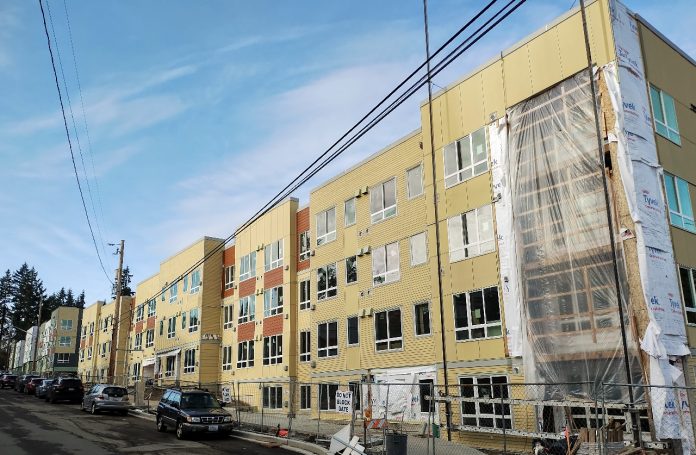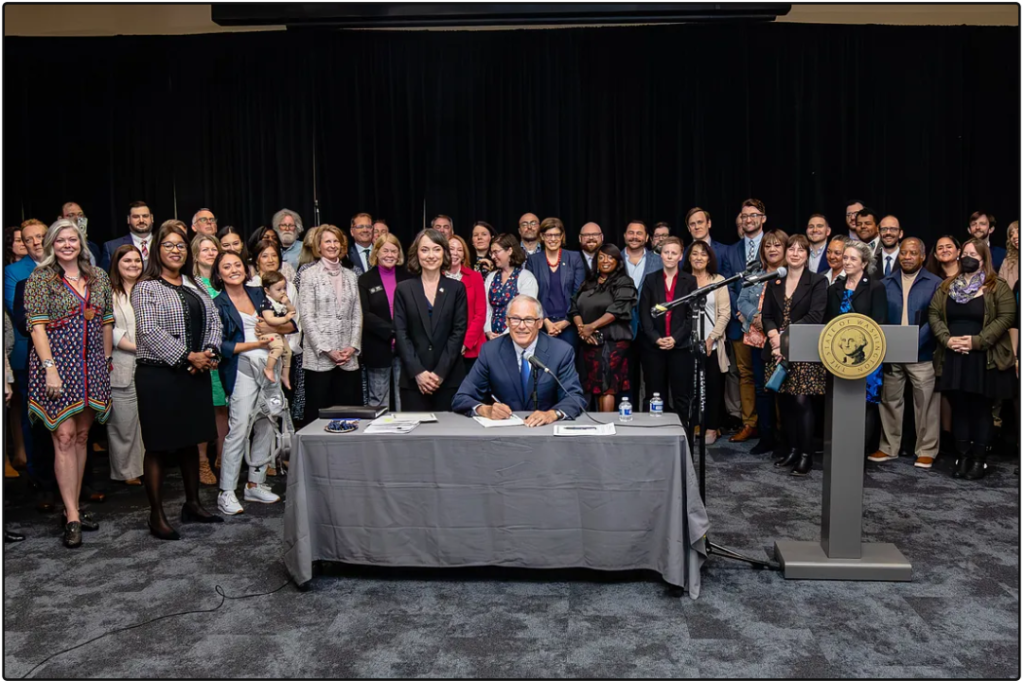
The bill could result in a builder’s remedy to force resistant jurisdictions to allow apartment construction.
Representative Jessica Bateman (D-22, Olympia) has filed a brand new bill that seeks to push local governments to increase housing production, especially those that have set up a regulatory gauntlet to restrict homebuilding. Dubbed Washington’s Housing Accountability Act, House Bill 2113 seeks to go further than the accountability framework created with the 1990 Growth Management Act (GMA) currently does. Bateman pre-filed the bill ahead of the start of the legislative session on Monday.
Under the bill, cities would have to demonstrate to the state that they’re fully in compliance with the GMA, and state goals around housing, which direct cities to plan for and accommodate housing that is “affordable to all economic segments of the population of this state, promote a variety of residential densities and housing types, and encourage preservation of existing housing stock.” The state will maintain a full list of jurisdictions that are maintaining compliance, and localities that are out of compliance could have state grants or loans for public facilities withheld if they don’t take action to bring themselves into compliance.
The bill also employs what has become known in California as a “builder’s remedy” — if a city or county’s housing element is found to be out of compliance, that jurisdiction isn’t allowed to deny a permit to anyone seeking to build a building of any size (within an area zoned for multifamily housing) as long as at least 20% of the units in the planned building are set aside for households making 60% of the county’s area median income or below — $65,760 for a two-person household in King County — or if other measures that ensure long-term affordability are met.
“The system that we have in Washington historically has given a lot of autonomy to cities to determine what type of housing can be legal, and where,” Bateman told The Urbanist. “And we’ve seen where that has gotten us over the decades since the Growth Management Act has passed, we are in a situation where we’re in a housing crisis, we’re incredibly behind in our production of housing, and the forecast is that we will continue to be behind.”
The GMA has been relatively effective at limiting exurban sprawl on the edges of metropolitan areas, which has helped preserve farms, forests, and wilderness from the encroach of suburban development. However, the GMA has not been particularly effective at pushing cities within the urban growth area to encourage (let alone allow) housing growth, and urban homebuilding has not picked up the slack as suburban sprawl has slowed. This mismatch has fueled the flames of the state’s housing crisis.

Currently, the state’s Department of Commerce oversees local planning and offers guidance to counties, cities, and towns working toward making changes to their zoning and land use code as dictated by state law. Thanks to the significant number of new housing bills passed in recent years, local governments are grappling with more changes they’ll need to make to their land use regulations than have been imposed on them in decades.
For example, 2021’s House Bill 1220 requires cities to explicitly break down their housing targets based on the anticipated income levels of the households who will need access to that housing, and it stipulates all Washington cities must accommodate permanent supportive, which is typically reserved for people exiting homelessness who require significant on-site services, housing anywhere they allow residential dwelling units or hotels.
Meanwhile, 2023’s House Bill 1110 is set to require cities to stop banning small-scale developments like cottage housing or townhouses on residential single-family lots in most jurisdictions within major urban growth areas, regardless of population.

But if cities decide to veer away from guidance provided by Commerce, or otherwise decide to chart their own path when it comes to land use regulations, the only immediate recourse for residents within those jurisdictions is to appeal to the state Growth Management Hearings Board, a body created with the 1990 Growth Management Act to settle planning disputes. That process is often lengthy, and requires private citizens or nonprofit advocacy organizations to hire land use lawyers to make their case, and disputes can be tied up at the board for years, racking up legal costs.
“What we are seeing currently is cities, maybe they have a housing element that says permanent supportive housing is ‘wink, wink’ legal,” Bateman said. “And their ordinance says, technically, it’s legal. But then when the nonprofit goes to get a permit for the permanent supportive housing all of a sudden, ‘oh, you’re out of compliance, you don’t have what’s required… Here’s all of these barriers to actually issuing you that permit.'”
In December, the Kenmore City Council rejected a development agreement that their own city staff had worked to create that would have paved the way for a 100-unit permanent supportive housing building close to transit along Bothell Way NE, throwing the project’s financial plan into jeopardy, after a marathon meeting in which local residents voiced their opposition to the idea. Under House Bill 2113, the Kenmore City Council’s actions could lead to the city being deemed out of compliance.
Ultimately, the bill is intended to ensure that the significant work that the state legislature is doing to reduce barriers to housing construction aren’t stymied at the local level, as Washington faces a titanic projected need for housing over the coming decades. Washington State is well short of the pace it need to reach its goal of adding one million homes over the next 20 years and targeting many of them toward lower income households, Bateman noted.
“We have our work cut out for us,” Bateman said. “This is an opportunity for us to create a system of accountability to ensure that cities are abiding by the law, and that they’re doing what’s required, and providing a system for how we hold them accountable. What does that look like? What type of process do we create? How do we ensure that there’s ramifications that connect to what we’re trying to solve, in terms of creating more affordable housing.”
Ryan Packer has been writing for The Urbanist since 2015, and currently reports full-time as Contributing Editor. Their beats are transportation, land use, public space, traffic safety, and obscure community meetings. Packer has also reported for other regional outlets including BikePortland, Seattle Met, and PubliCola. They live in the Capitol Hill neighborhood of Seattle.

